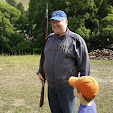 I've read all of Peter Cozzens' Civil War books. I started with Darkest Days of the War on Iuka and Corinth, moved on to his trilogy on the Kentucky / Tennessee / Georgia theater, and last read his biography of John Pope. All of them are good reads that should inspire any ACW gamer. Cozzens includes the tactical minutae of each battle. Between the text and maps, Cozzens provides a lot of scenarios for regimental battles.
I've read all of Peter Cozzens' Civil War books. I started with Darkest Days of the War on Iuka and Corinth, moved on to his trilogy on the Kentucky / Tennessee / Georgia theater, and last read his biography of John Pope. All of them are good reads that should inspire any ACW gamer. Cozzens includes the tactical minutae of each battle. Between the text and maps, Cozzens provides a lot of scenarios for regimental battles.Cozzens' works have all focused on the western theater, although his Pope biography understandably spends a great deal of time on Second Bull Run. Shenandoah 1862 is Cozzens' first work focused entirely on an eastern campaign.
Now there have been a lot of works on Stonewall Jackson's valley campaign, so why would Cozzens bother writing on it? Everything I've read on the valley has focused on Jackson and the Confederate army, with authors acting as Stonewall admirers at best, cheerleaders at worst. Cozzens takes a much more balanced approach that will be familiar to anyone who has read his other works. He presents the Union side of the campaign with a thoroughness I've not seen in any other study, and the result is the best balanced account of the 1862 campaign I've ever read.
It's clear Cozzens admires Jackson's accomplishment, but he also faults some of Jacksons moves and traits as a commander. Cozzens avoids any lost cause hagiography of Jackson. Instead of reporting what contemporaries said about Jackson after the campaign, Cozzens focuses on Confederate letters, diaries, and journals written at the time. Even Stonewall Jackson, in the midst of his most famous campaign, had his detractors in the ranks. Jackson was never a good battlefield general, and Cozzens criticizes his tactical movements convincingly.
The most impressive thing about this book is the understanding Cozzens brings to Federal movements in the valley. Jackson won his campaign through deft movement and hard fighting, but he was helped by uncoordinated Union advances and decidedly second rate Union commanders. Fremont and Shields come in for some harsh criticism for their handling of Cross Keys and Port Republic, for example. But Cozzens seems to admire the leadership of Banks and McDowell, or at least to have a good appreciation for the limits under which they operated and some sympathy for their situations.
In sum then, Cozzens gives us the best account of the campaign to date. The book is a balanced look at the commanders, armies, movements, and battles in one of the most famous campaigns in American military history.











Scott - Just wanted to thank you for your kind words about Shenandoah 1862. I think you summarized nicely my feelings about Jackson's management of the campaign. I'm planning to return West with a book on Shiloh that I hope will turn out like This Terrible Sound. Best regards, Peter Cozzens
ReplyDelete